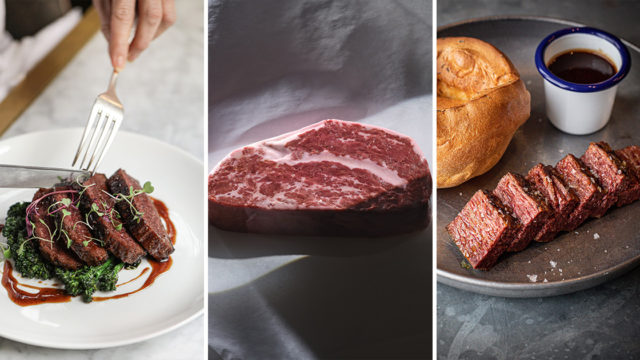Impossible Foods has named its first chief marketing and creative officer, advertising veteran Leslie Sims, following a few pull-no-punches interviews from the Silicon Valley startup’s CEO about the failures of the alternative meat category.
Peter McGuinness, the company’s top exec since April, has said publicly that Impossible and others in the space have done “a lousy job” of communicating with American consumers. He’s taken aim at Impossible’s sporadic marketing, pointing out to Food Navigator-USA that “86% of the country hasn’t even heard of us.”
Sims, leaving her current gig at Deloitte Digital and joining Impossible in January, has marching orders that include building awareness, spiking trial and, in a broader sense, lighting a path for the faltering faux meat segment.
That’s a tall order for what Sims described as one of the “biggest leaps” she’s ever taken in her two-plus decade career. With a CV that includes CCO stints at Y&R and Ogilvy, this is the first brand-side job for Sims, where she will oversee an in-house marketing team and potentially hire an outside agency. (Under previous chief experience officer Steve Turner, Impossible has worked with Portland-based Wieden+Kennedy on the bold “We Are Meat” campaign.)
Sims’ goals include advertising that will be “in more places in a more coordinated and connected way,” she told Adweek. “It’s like the old saying, if you don’t control the narrative, someone else will. We need to be out there educating people about our value proposition.”

Growing awareness, increasing appeal
McGuinness, also an agency alum and former CEO of Chobani, noted that the current slide in plant-based meat has not dragged down Impossible, which reports a 60% increase in retail sales over the past 52 weeks, per IRI data.
Some competitors, on the other hand, have struggled, with Lightlife showing an 18% decrease during the same period and Morningstar Farms logging a nearly 14% drop, according to IRI. Beyond Meat has been contending with sales decreases of nearly 5%, per IRI, along with weightier issues: the company recently cut more than 20% of its global workforce amid a stock price plunge and purged two C-suite execs after wider-than-expected second quarter losses.
After explosive growth during the early 2020 pandemic, sales of fake meat have dipped, with refrigerated plant-based products dropping nearly 12% over the past year, per IRI. Overall, the U.S. market for alt beef, pork, chicken, sausage and other proteins is expected to reach $8 billion this year, up from $3 billion in 2017, per IBISWorld.
While Impossible remains bullish on plant-based meat, others in the industry have pulled back. Food behemoth JBS ditched its faux meat division, Planterra Foods, and Maple Leaf Foods, the Canadian-based parent of Lightlife and Field Roast, is refocusing some of its resources on traditional protein.
Against that backdrop, McGuinness spoke to Adweek about how the emerging space can define itself, why Sims is the right fit for the newly created post and how Impossible aims to steal meat eaters from Big Beef.
Adweek: Can you give some specifics about Impossible’s marketing going forward?
Peter McGuinness: Getting the messaging and tone right is absolutely key. The value proposition for us and the category is a bit clunky. The food is as delicious as the animal, but it’s also better for you, with no cholesterol and lower fat. And then it’s better for the planet in terms of water, land, trees and carbon avoidance. That’s a mouthful. So I think we need to crack that code. And from there, we need to communicate on a sustained basis across all channels to reach as many consumers as possible. That’s not something we’ve done yet in a really coordinated, continuous way, especially in terms of paid marketing and advertising, but it’s a big opportunity.
Leslie knows how to do all of that and more. She really gets communications and built a modern demand marketing engine that served her clients at Deloitte well. I’m excited to see what she’ll do to bring our products and promise to the masses.
How do you see Impossible communicating its own message while “carrying the torch” for the broader plant-based meat category?
We’re working to take what we have to the next level. That includes investing in innovation and continuously improving our products, which we’re doing, and then building out the front end commercial part of the business so that the world knows we make great products and can find them. We want to be a very inclusive brand that invites everyone, including meat eaters, to try our products in a very non-judgmental, non-righteous way. Leslie is here to crack that code and help us get the word out in a way that resonates. It’s about building awareness, approachability and availability.
Why do you think plant-based meat has seen significant sales declines (while consumer adoption of plant-based food like dairy remains extremely high) and how can you plan to counter that?
The category is a mixed bag of players—some big, some small, some good, some not so good. As a category we all have to up our game. And the category must transcend vegan and vegetarian audiences and also appeal to meat eaters—a $1.4 trillion market. The fact that our sales have continued to see 60% growth this year, that’s a real testament to our products and the potential of our brand, and it’s something we’re going to continue to invest in in order to make the best possible products. We’re going from the best plant-based meat to the best meat.
It’s hard to think about plant-based protein as nascent given the massive amounts of coverage about the category, but it almost sounds like you want to relaunch the category. Can you please elaborate on that?
There’s been a lot of hype for sure. Now the category and the companies within it need to deliver. We want to compete in not just the $3 billion plant-based meat industry, but the trillion-dollar meat industry. Our part of the category, which competes directly with meat, has only been around for about four or five years now. Compared to animal meat, we’re a rounding error. We have low awareness and household penetration—83% of the country hasn’t heard of Impossible yet. 95% of the U.S. hasn’t even tried us and despite that, we’re in hyper growth. So that’s really exciting. If we get the products right and communicate with consumers effectively, there’s so much more room for growth. The products and messaging both have to appeal to meat eaters. You can’t have one without the other. That’s the trillion-dollar opportunity to change the world.
https://www.adweek.com/brand-marketing/impossible-foods-hires-ad-agency-vet-as-first-cmo-as-faux-meat-category-falters/


